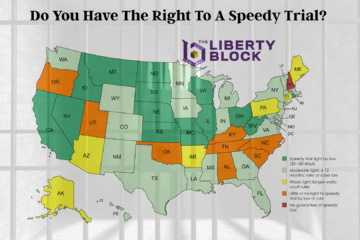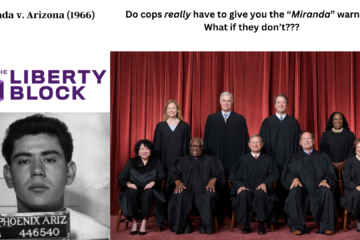One of the most well known Supreme Court cases is not well understood by the casual observer. While the general belief that it requires prosecutors to share exculpatory evidence with the defendant is true, the actual case is more nuanced.
Maryland has a unique constitutional provision that makes juries “Judges of Law, as well as of fact.”
Brady v. Maryland (1963) involved John Brady and Charles Boblit, who were both charged with first-degree murder. The sole victim was strangled to death with a shirt, and it was initially unclear which of the perpetrators in the kidnapping did the killing. But due to Maryland’s “felony murder” doctrine, anyone involved in the felonious conduct related to death could be charged with first-degree murder (I explain this concept in Presumed Guilty).
John Brady was tried first. His lawyer “conceded that Brady was guilty of murder in the first degree, asking only that the jury return that verdict “without capital punishment.”
Based on the prosecution’s evidence, the jury found him guilty of first-degree murder with capital punishment, sending him to be executed by the state. Before the trial, Brady’s lawyer had asked the prosecutors to hand over all relevant evidence including all statements made by Brady and Boblit. They shared all Boblit’s statements except the one in which he confessed to being the actual killer.
When the statement was discovered at Boblit’s trial, Brady “moved the trial court for a new trial based on the newly discovered evidence that had been suppressed by the prosecution.” The court denied his motion, and the Maryland Court of Appeals dismissed the appeal without prejudice, which allowed Brady to seek relief under the Maryland Post-Conviction Procedure Act.
Brady then filed a petition for post-conviction relief, which was also dismissed by the trial court. On appeal, the Court of Appeals held that suppression of the evidence by the prosecution did violate his due process, and remanded the case for a retrial for the question of punishment, not the question of guilt. The Court reasoned that “There is considerable doubt as to how much good Boblit’s undisclosed confession would have done Brady if it had been before the jury.”
Brady appealed to the SCOTUS, which affirmed the ruling in a 7-2 opinion. The Court agreed with the Maryland Court of Appeals that the confession would not have made any difference to the jury except for possibly making them prefer life imprisonment over execution. Brady had a new trial to determine the punishment, and the jury this time spared him the execution; he was still sentenced to life in prison for murder.
The SCOTUS threw defendants a bone, though, adding that “We now hold that the suppression by the prosecution of evidence favorable to an accused upon request violates due process where the evidence is material either to guilt or to punishment, irrespective of the good faith or bad faith of the prosecution.”
Prior to Brady, the main case involving exculpatory evidence was Napue v. Illinois (1959), which held that the failure of the prosecutor to correct the testimony of the witness which he knew to be false denied petitioner due process of law in violation of the 14th Amendment.
In Mooney v. Holohan (1935), the SCOTUS ruled on what nondisclosure by a prosecutor violates due process:
It is a requirement that cannot be deemed to be satisfied by mere notice and hearing if a state has contrived a conviction through the pretense of a trial which, in truth, is but used as a means of depriving a defendant of liberty through a deliberate deception of court and jury by the presentation of testimony known to be perjured. Such a contrivance by a state to procure the conviction and imprisonment of a defendant is as inconsistent with the rudimentary demands of justice as is the obtaining of a like result by intimidation.
In Pyle v. Kansas (1942), The SCOTUS said that:
Petitioner’s papers are inexpertly drawn, but they do set forth allegations that his imprisonment resulted from perjured testimony, knowingly used by the State authorities to obtain his conviction, and from the deliberate suppression by those same authorities of evidence favorable to him. These allegations sufficiently charge a deprivation of rights guaranteed by the Federal Constitution, and, if proven, would entitle petitioner to release from his present custody.
After Brady, SCOTUS a few more cases refined this rule:
Giglio v. U.S. (1972) – the prosecution failed to tell the defendant and jury that their star witness testified in exchange for leniency. This was deemed by the SCOTUS to be “material.” This violated the defendant’s right to due process, even if negligible and even though it was not done in bad faith.
U.S. v. Bagley (1985) – the prosecution failed to tell the defendant and jury that their star witness was a paid informant. The defendant was convicted of a narcotics offense. The SCOTUS held that this info was not material; there was not a reasonable probability that the outcome would have been different. The informant was technically only paid for the testimony on the firearm charge, which the defendant was acquitted of.
In Kyles v. Whitley (1995), the SCOTUS held that the failure to disclose evidence violated Kyles’ due process and clarified 4 aspects of this test:
- “Reasonable probability” is a question of whether the government’s failure to disclose this information undermines confidence in the outcome of the trial.
- “Reasonable probability” is not a sufficient evidence test and the defendant does not need to show that the evidence, barring any evidence undermined by the withheld information, is inadequate to support a conviction. Rather, the defendant merely must show that the withheld information can reasonably be taken to put the whole case in a different light.
- Failure to disclose information which has a reasonable probability of changing the outcome of the trial is inherently harmful, thus there is no need for a separate harmless error review.
- All information not disclosed must be considered collectively, not item by item.
Brady and its related cases all failed to prescribe a remedy for violations by prosecutors, leaving it difficult for defendants to receive dismissals of charges or other forms of relief.
This article does not necessarily reflect the opinions of The Liberty Block or any of its members. We welcome all forms of serious feedback and debate.


